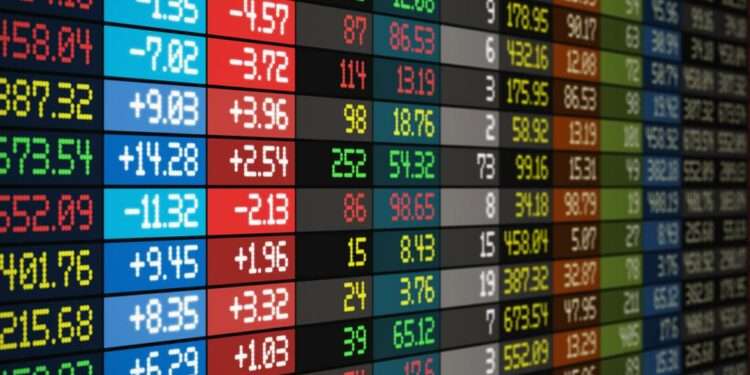Trading activities on the stock market experienced a significant surge in the final week of February, marking a remarkable uptick in volume and turnover compared to the preceding week.
The total volume traded skyrocketed to 3,866,526 shares, a stark contrast to the previous week’s 733,867 shares. This surge in trading volume was accompanied by a corresponding increase in turnover, reaching GH¢6,502,780.49, compared to GH¢871,017.85 recorded in the previous week.
MTNGH emerged as the market leader during the active trading week, dominating with a traded volume of 3,444,715 shares, translating to a value of GH¢4,911,184.06. The telecommunications giant’s robust performance underscored investor confidence in its growth prospects and market position.
Aside from telecommunications, notable trades also transpired across various sectors, including manufacturing, finance, and distribution. Fan Milk PLC (FML), Total, and Access were among the top five traded equities for the week, reflecting a diverse range of investor interests and market dynamics.
Fan Milk PLC (FML), a leading player in the manufacturing sector, garnered significant trading activity, highlighting investor confidence in its brand and market position. Similarly, Total, a prominent player in the energy sector, attracted substantial trading volume, indicative of investor interest in the company’s performance and strategic initiatives.
Access Bank, representing the finance sector, also featured prominently among the top traded equities, signaling investor optimism in the banking industry’s resilience and growth potential.
Mixed Performances on the Ghana Stock Exchange
The week on the Ghana Stock Exchange (GSE) witnessed a mix of gains and losses among key equities, reflecting the dynamic nature of the market.
Standard Chartered Bank (SCB), Unilever (UNIL), Ecobank Ghana (EGH), and MTN Ghana (MTNGH) reported gains of GH¢1.72, GH¢0.97, GH¢0.60, and GH¢0.04, respectively, closing at GH¢19.25, GH¢10.25, GH¢6.10, and GH¢1.44. Conversely, Fan Milk PLC (FML) experienced a decline of GH¢0.05, concluding the week at GH¢3.30.
Despite the mixed performances of individual equities, the total market capitalization of the GSE saw a notable decrease, plummeting by GH¢1.01 billion to settle at GH¢75.62 billion. This decline highlights the impact of various market factors on overall market valuation and investor sentiment.
On a contrasting note, the Ghana Stock Exchange Composite Index (GSE-CI) experienced a robust week, posting a gain of 92.86 points to close at 3,278.04 points, resulting in a Year-To-Date (YTD) gain of 4.72%.
This upward trajectory reflects the overall positive performance of the composite index, driven by the collective performance of constituent stocks across various sectors.
Simultaneously, the GSE Financial Stocks Index (GSE-FSI) closed at 1,996.71 points, marking a 73.81-point increase from the week’s opening level and boasting a YTD return of 5.00%.
The Impressive performance of the financial stocks index highlights the resilience and strength of the financial sector within the Ghanaian market, buoyed by sustained investor confidence and robust fundamentals.
Implications and Outlook
These developments on the GSE offer a comprehensive snapshot of the dynamic movements within the Ghanaian financial ecosystem. While individual equities experienced mixed performances, the overall market indices, particularly the GSE-CI and GSE-FSI, reflect positive momentum and resilience in the face of market fluctuations and external uncertainties.
The surge In trading activities during the final week of February pinpoints the dynamism and resilience of the stock market, even amidst global economic uncertainties and market volatility.
Investors’ increased participation and trading volumes also reflect growing confidence in the recovery trajectory and long-term prospects of various sectors.
As the market steer through the uncertainties of the global economy, market participants are advised to remain vigilant, stay abreast of market developments, and conduct thorough research before making investment decisions.
While opportunities for growth and value creation abound, prudent risk management and strategic asset allocation remain paramount in navigating the evolving market.
Looking ahead, continued economic recovery, policy developments, and corporate earnings announcements are expected to influence market sentiment and trading activities. As such, investors are encouraged to adopt a balanced approach, diversify their portfolios, and leverage expert insights to capitalize on emerging opportunities while managing risks effectively.
READ ALSO: A Journey Through Top 10 Richest Countries in Africa























